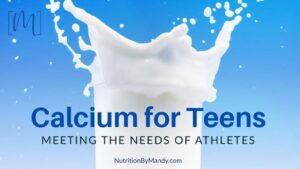Last Updated on November 28, 2025 by Mandy Tyler, M.Ed., RD, CSSD, LD
Sports Nutrition Tips for a Healthy Immune System
As the winter months approach, I encourage athletes to be proactive and take steps to promote a healthy immune system.
Here are some of my top tips for supporting a healthy immune system this winter.
Consume Adequate Calories to Support a Healthy Immune System
The first step athletes can take to support a healthy immune system is ensuring they consume enough calories to support their health, training, and performance needs.
Underfueling, particularly when combined with intense training, can lead to decreased immune function as well as an increased susceptibility to illness (1, 2).
Athletes commonly expend a high number of calories in training and competitions, as well as everyday activities. To support this high level of activity, it is important they consume a well-planned sports nutrition diet that provides for their daily calorie needs.
Pro Tip: Athletes should be aware that in addition to the impact underfueling has on the immune system, it can also negatively impact their sports performance.

Fill Your Plate with Immune Boosting Foods
I encourage athletes to make it a priority this winter to fill their plates with immune boosting foods. Specific nutrients that are important for supporting a healthy immune system include Vitamins A, C, D, and E, as well as selenium and zinc (3, 4, 5).
The table below provides an overview of foods containing these immune boosting nutrients.
| Nutrient | Food Sources |
| Vitamin A | Milk, cheese, eggs, beef liver, leafy greens, sweet potatoes, carrots, cantaloupe, mango |
| Vitamin C | Oranges, grapefruit, kiwis, strawberries, broccoli, bell peppers, tomatoes, potatoes |
| Vitamin D | Milk, fatty fish, fortified orange juice, plant-based milks, and yogurts |
| Vitamin E | Wheat germ, vegetable oils, almonds, peanuts, sunflower seeds, spinach, broccoli |
| Selenium | Brazil nuts, fish, shellfish, beef, poultry, eggs, dairy products, whole grains, beans |
| Zinc | Meat, poultry, seafood, oysters, beans, nuts, whole grains, fortified cereals |
Pro Tip: An immune boosting fruit smoothie can be a great addition to an athlete’s meal plan during the winter months. Just combine your favorite immune boosting foods listed in the chart above for a power-packed breakfast on-the-go or healthy afternoon snack.
Enjoy a Variety of Fruits and Vegetables to Support a Healthy Immune System
As a starting point, I recommend athletes eat a variety of fruits and vegetables with their meals and snacks. Fruits and vegetables are packed full of vitamins, minerals, antioxidants, and phytochemicals, which provide numerous health benefits, including promoting a healthy immune system.
At each meal, I encourage athletes to fill 1/3 of their plate with colorful fruits and vegetables.
Pro Tip: This winter, enjoy a variety of seasonal produce, including: oranges, grapefruit, leafy greens, carrots, pumpkins, sweet potatoes, potatoes, Brussels sprouts, beets, and winter squash.

Vitamin D and Immune Health
I feel it is important to call special attention to Vitamin D when discussing immune health during the winter months.
Having low levels of Vitamin D is associated with an increased susceptibility to illnesses, such as upper respiratory tract infections. In addition, research has shown that Vitamin D plays an important signaling role that is important for optimal functioning of the immune system (3).
Vitamin D in the Winter Months
The body produces Vitamin D through exposure to sunlight. However, during the winter athletes tend to get less exposure to sunlight, spending more time indoors and wearing additional layers of clothing blocking UV rays.
In addition, the angle of the sun is lower in the winter, which decreases the body’s effectiveness at synthesizing Vitamin D. This is particularly the case in areas of the county located at higher northern latitudes (3).
Unfortunately, food sources of Vitamin D are limited; thus, Vitamin D deficiency is common in athletes during the winter months (6).
Know Your Vitamin D Status
Given the importance of Vitamin D for optimal immune health, I recommend athletes have their Vitamin D levels tested. A simple lab test can help determine if the athlete has sufficient Vitamin D levels to support overall health and wellness.
If an athlete has insufficient Vitamin D levels, visit with a sports dietitian nutritionist for help determining an appropriate supplementation strategy,
Hydrate to Support a Healthy Immune System
In addition to immune boosting foods, staying well-hydrated is important for the optimal function of the immune system.
Maintaining adequate hydration allows for the transportation of oxygen and nutrients throughout the body, including to the immune cells. In addition, adequate hydration allows for the removal of waste from the body (7).
Dehydration negatively impacts the function of the body’s immune cells (4). Dehydration can also impact the gut microbiota, resulting in a decreased number of immune cells and an impaired ability to remove pathogens from the body (8).
Based on the impact dehydration can have on optimal immune system function, athletes should make it a daily priority to stay hydrated during the winter months.
Hydration Tips for the Winter Months
Tips to help athletes stay on top of their hydration needs this winter include:
- Drink warm beverages during the day – hot chocolate made with milk, hot tea with honey, herbal teas, and cider are all good options.
- Enjoy broth-based soups with meals – simple way to help athletes increase their fluid and electrolyte intake.
- Add fruits and vegetables with a high-water content to meals and snacks, ideas include: oranges, grapefruit, tomatoes, cucumbers, celery, and bell peppers.
- Carry a water bottle throughout the day as a reminder to hydrate.
Pro Tip: Try making a Golden Milk Latte with high-protein milk this winter. This is a tasty way to warm up and enjoy the anti-inflammatory benefits of turmeric.
Hydrate When Exercising in the Cold
Don’t forget to hydrate when exercising in the cold weather. Although athletes may not feel as hot as they do during the summer months, hydration is still important.
When exercising in the cold, it is common for athletes to under consume fluids, as they may experience a reduced thirst sensation and desire to drink (9). Thus, I encourage athletes to have a hydration plan in place for their workouts.
Although the individual hydration needs of athletes vary, a general guide is for athletes to aim to drink ~3-8 ounces of fluid every 15-20 minutes (0.4-0.8 L per hour) of activity (9, 10).
From a practical standpoint, drinking a big gulp of water or sports drink is equivalent to approximately 1 ounce of fluid. Therefore, athletes should aim for several big gulps from their water bottle every 15-20 minutes of activity.
Sleep and Immune Health
Getting adequate sleep is an important step athletes can take this winter to support overall immune health. Lack of sleep is associated with a disruption of the body’s immune response, increasing susceptibility to infection and inflammation (11).
The American Academy of Sleep Medicine recommends the following (12, 13):
- Youth 6-12 years old: 9-12 hours of sleep per night
- Teenagers 13-18 years old: 8-10 hours of sleep per night
- Adults: ≥ 7 hours of sleep per night

Support a Healthy Immune System by Getting Adequate Sleep
If athletes are currently getting less than the recommended amount of sleep each night, I recommend they take steps to improve their sleep habits this winter.
Ideas to support sleep quality include (14):
- Make the bedroom cool, dark, and quiet (like a cave)
- Create a consistent sleep routine by going to bed and getting up at the same time each day
- Limit the use of electronics before bed
- Use the bed for sleeping only, not for studying, watching TV, or playing video games
- Develop a relaxing sleep routine, such as reading, journaling, deep breathing, or mindfulness exercise
Wash Your Hands to Support a Healthy Immune System
Handwashing is one of the most important steps that athletes can take to reduce the risk of spreading germs and getting sick this winter.
Most importantly, I encourage athletes to wash their hands:
- Before preparing food
- Before and after eating
- After touching your face, blowing your nose, or sneezing
- After working out in a shared gym space (lifting weights, treadmill, etc.)
- After using the restroom
When washing hands, athletes should use soap and running water, and thoroughly scrub their hands for at least 20 seconds to remove germs.
If athletes do not have access to soap and water, the Centers for Disease Control and Prevention recommends using an alcohol-based hand sanitizer that contains at least 60% alcohol.
Dress Warmly for the Cold Weather
When athletes will be spending time outdoors in the cold weather they should make sure to dress warmly.
For outdoor practices, athletes should dress in layers, which can be easily removed as the athlete warms up. In addition, athletes should wear gloves as well a hat that covers their head and ears to keep warm.
Following the workout, athletes should make sure to remove wet socks and clothing. They can also enjoy a warm drink, such as hot chocolate made with milk, which can help them warm up and support their recovery nutrition needs.

Sports Nutrition Tips for a Healthy Immune System
You are now set with a variety of steps athletes can take this winter to support a healthy immune system.
For additional sports nutrition tips, make sure to check out my blog on gut health for athletes.
Join the Nutrition By Mandy Email List & Get a Free Weekly Meal Planner Template
Click HERE to join the Nutrition By Mandy e-mail list. When you join you will receive a free weekly meal planner template to download and plan out your meals for the week.
About the Author
Mandy Tyler is a Sports Dietitian Nutritionist in the San Antonio, TX area. She is a Registered and Licensed Dietitian, a Board-Certified Specialist in Sports Dietetics, a Licensed Athletic Trainer, and is a Certified Exercise Physiologist through the American College of Sports Medicine. Mandy has experience working with athletes at the high school, collegiate, and professional levels. She believes the key to reaching one’s full potential, both in everyday life and in sports performance, relies on a healthy nutritional foundation.

If you are looking to take your performance to the next level, make sure to check out my new Sports Nutrition Game Day Guide. This downloadable guide is written to help athletes develop an individualized plan to achieve peak performance on game day.





